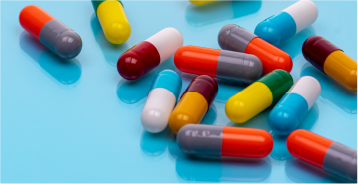The rise of antimicrobial resistance
 Medical Conditions
Medical Conditions
We need to process your personal information for you to interact with this website. We also use Cookies to enhance your experience. Please accept the Website Ts and Cs and Data Protection and Privacy Policy to fully access the website.
Disability is defined as “a physical or mental condition that makes it difficult for somebody to do some things that most other people can do.” You can be born with a disability or a disability may occur later in your life. According to the World Health Organization (WHO), about 1.3 billion people “experience significant disability”.
Disabilities may include, but are not limited to:
Challenges faced
Environmental and personal factors play a significant role in how people with disabilities experience everyday life and how their medical needs are met.
Factors, such as negative attitudes towards disabled people, as well as inaccessible environments and transportation, may greatly limit those with a disability to participate equally in society than those without a disability. Many with disabilities especially face unfair discrimination when excluded from education and employment opportunities, which could lead to or exacerbate poverty.
In terms of medical needs being met, those who need assistive aids, apparatus and appliances (such a hearing aids, specialised spectacles and/or wheelchairs), but cannot access these benefits due to financial strain or lack of access to adequate healthcare facilities, may experience more limitations than those who do have access.
Persons with disabilities may also be more at risk (in some cases, double the risk than people without disabilities) of developing comorbid conditions. These conditions may include poor oral health, asthma, diabetes, obesity, depression, or stroke. Some disabled people may die up to 20 years earlier than the average expectancy. These risks are increased when there is a lack of access to healthcare facilities and/or healthcare professionals, who have the correct knowledge and understanding of various disabilities.
What can we do?
The South African Human Rights Commission identifies disability as one of seven focus areas “within its mandate to promote, protect, and monitor the realisation of Human Rights in South Africa.”
All members of society can contribute to improving the quality of life of those among us who are disabled. We can accomplish this by:
References:
Oxford Learners Dictionaries. 2022. Disability. Available [Online]: https://www.oxfordlearnersdictionaries.com/definition/english/disability?q=disability. [Accessed: 13 December 2022].
Perfect Life Span. 2022. 5 Ways to empower people with disabilities. Available [Online]: https://perfectlifespan.com/2022/07/20/5-ways-to-empower-people-with-disabilities/. [Accessed: 19 December 2022].
South African Government. 2022. Disability Rights Awareness Month 2022. Available [Online]: https://www.gov.za/DisabilityRightsAwarenessMonth2022. [Accessed: 12 December 2022].
South African Human Rights Commission. 2016. Disability. Available [Online]: https://sahrc.org.za/index.php/focus-areas/disability-older-persons/disability#sppb-modal-1670929645. [Accessed: 12 December 2022].
World Health Organization. 2022. Sensory functions, disability and rehabilitation. Available [Online]: https://www.who.int/teams/noncommunicable-diseases/sensory-functions-disability-and-rehabilitation. [Accessed: 12 December 2022].
World Health Organization. 2022. Disability. Available [Online]: https://www.who.int/news-room/fact-sheets/detail/disability-and-health. [Accessed: 12 December 2022].
World Health Organization. 2022. Disability. Available [Online]: https://www.who.int/health-topics/disability#tab=tab_1. [Accessed: 12 December 2022].
World Health Organization. 2022. Disability. Available [Online]: https://www.who.int/health-topics/disability#tab=tab_2. [Accessed: 13 December 2022].